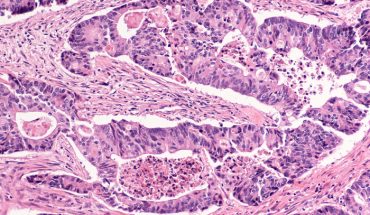A new breast cancer test which may be able to accurately and quickly predict those at risk of their cancer spreading is being trialled at the University of Bradford’s Institute of Cancer Therapeutics.
It could mean those at low risk could avoid undergoing gruelling follow-on treatment as well as potentially save the NHS millions of pounds a year.
In pilot studies, the test – Ran Diagnostics – has proved 98 per cent accurate in predicting which patients are at low risk of their cancer spreading or returning – referred to as metastasis – after their initial treatment. Now a trial funded by Innovate UK is being conducted to test whether Ran Diagnostics works in practice.
Professor Chris Twelves, Clinical Director of the Institute of Cancer Therapeutics, University of Bradford, who is leading the study, said: “When people are first diagnosed with breast cancer, their oncologist will want to discuss whether they may benefit from extra drug treatment to reduce the risk of the cancer returning and spreading.
“One of the ways we do that now is through a genetic test on the cancer, but that test is expensive and can be slow.
“If, as we hope, Ran Diagnostics is as good at identifying who may benefit from such extra treatment, it will be quicker and less expensive, helping us to better personalise cancer treatment for our patients.”
Associate Professor in Medicine Development at the University of Bradford, Dr Mohammad Isreb, said: “The Ran Diagnostics test has the potential to accurately predict the likelihood of someone newly diagnosed with breast cancer developing metastasis in the future more quickly and economically than current tests.
“It may help indicate who may benefit from extra treatment, and those at low risk, who may be able to be spared extra treatment and avoid its painful and unpleasant side effects.”
How it works:
The test is designed for people with the most common type of breast cancer – hormone receptor positive, HER2, receptor negative (HR+/HER2−). Ran Diagnostics works by identifying the presence of two proteins in cells of the original cancer, Ran GTPAse (Ran) and MMP-2.
In laboratory tests of 181 tumour samples from patients diagnosed with breast cancer in the 1990s and whose medical histories are known, the Ran Diagnostics test showed 98 per cent accuracy. The tests were supervised by Professor Mohammed El-Tanani, who has 20 years’ expertise in the area, as Professor of Molecular Pathology and Cancer Therapeutics at the University of Bradford.
Dr Jason Jones, Commercial manager, Faculty of Life Sciences, University of Bradford, said: “We measured levels of the two biomarkers in those samples then we looked at their medical histories to see which ones later developed metastatic disease.
“There is a clear correlation between high levels of Ran and MMP-2 and patient outcomes. Tests showed 98 per cent of patients with low levels did not go on to develop secondary cancer and therefore may have been spared chemotherapy. We have not seen anything with such a strong relationship as this before.”
The trial will be conducted in collaboration with Leeds Teaching Hospitals NHS Trust and the University of Leeds.
Advantages of Ran Diagnostics
Breast cancer is the most commonly diagnosed cancer globally, from which around 1,000 patients die every month*. Metastatic breast cancer – also known as secondary or stage four breast cancer – can be treated but not cured.
The NHS has committed to improving cancer care in its Long Term Plan and NICE recommends tumour profiling for some people with breast cancer to guide clinicians and patients decisions on the best treatment for patients.
Currently, there are three tests recommended by NICE – Endopredict, Oncotype DX and Prosigna. These involve a sample being sent to specialist laboratories. Oncotype DX, the most commonly used, costs £2,580. Prosigna costs £1,970 and Endopredict costs £1,500. (2018 figures)
However, Ran Diagnostics could be carried out within a hospital’s own pathology lab, with results potentially available within hours, for a fraction of the cost, at around a few hundred pounds.
Those involved in the trial estimate that every year in the UK, up to 33,000 patients with breast cancer may benefit from testing*. Based on the Oncotype DX price, if all 33,000 were tested, this would cost the NHS just over £85m a year. If Ran Diagnostics costs around £600, it would cost the NHS just under £20m.
Dr Isreb said: “Most European countries don’t routinely offer these genetic tests. Ran Diagnostics would offer a much more affordable solution, which would then also make it more accessible to lower to middle income countries like India and China.”
Next steps:
The team has been awarded an £897,000 Innovate Biomedical Catalyst grant to test a further 600 samples with known tumour profiling results to see if Ran Diagnostics gives equivalent results.
Ran Diagnostics will comprise of two elements: the physical testing kit used to stain the biomarkers along with AI-enabled software to analyse the data.
The grant also includes funding for Carmen Diagnostic Technologies Ltd, a spin-out company of the University of Bradford that owns the Intellectual Property (IP), to develop Ran Diagnostics into a regulatory-approved commercial product. If the new test is successful, Carmen Diagnostic Technologies could have the product available to use in clinic, possibly within as little as two to three years.
Professor Krzysztof Poterlowicz, Director of Research for Computational and Data-Driven Science at the University of Bradford and co-investigator in the project, said: “This groundbreaking project provides a unique opportunity to leverage the latest advancements in AI and data science to develop software that optimises the results of the Ran Diagnostics test.”
Everard Mascarenhas, Director of Carmen Diagnostics Technology, based in Southport, Merseyside, said: “Ran Diagnostics utilises equipment and pathology expertise that already exists in the hospital and can be adopted very quickly in hospitals around the world. Furthermore, as the cancer tumours can be tested by the hospital, unlike genetic tests where samples have to be transported internationally, Ran Diagnostics is closely aligned to helping the NHS achieve its net zero climate change objectives.
“A further limitation of existing genetic tests is that they only work for around 70 per cent of breast cancers. The science behind Ran Diagnostics means it can work for all breast cancer. In the future, there is the potential for a similar test to be used on other forms of breast cancer as well as other cancers.”
Professor Sherif El-Khamisy, Director of the Institute for Cancer Therapeutics at the University of Bradford, said: “Our mission at the Institute of Cancer Therapeutics is developing smarter and personalised ways to diagnose, predict and treat cancer.
“Ran Diagnostics is an important step towards achieving our aspirations by providing a cost-effective, rapid and potentially point-of care test that informs more personalised cancer treatments that help reducing the risk of the cancer coming back or spreading to other parts of the body.”
HISTORY:
Mohamed El-Tanani, Professor of Molecular Pathology and Cancer Therapeutics, started researching the cancer biomarker, Ran, more than 20 years ago while at the University of Liverpool and then Queen’s University, Belfast.
He joined the Institute of Cancer Therapeutics at the University of Bradford in 2015, bringing with him the biomarkers project. When he started looking at Ran in combination with other biomarkers, he discovered the link with MMP2, which significantly improved the prognostic power of Ran.
Professor El-Tanani is now a visiting Professor at the University of Bradford, and will advise on the study.
The vast majority of breast cancer deaths are women, with 11,400 deaths every year (2017-2019). There are around 85 deaths of males from breast cancer every year. (2017-2019). Figures from Cancer Research UK.
Estimate based on 55,000 annual occurrence of breast cancer in the UK. About 60% of cases would be eligible for testing = 33,000.
Professor Twelves is also Professor of Clinical Cancer Pharmacology and Oncology at the University of Leeds, and Consultant Medical Oncologist and Director of the National Institute for Health and Care Research (NIHR) Leeds Cancer Research Facility.
Information on Innovate UK:
Innovate UK, part of UK Research and Innovation, is creating a better future by inspiring, involving and investing in businesses developing life-changing innovations. We provide targeted sectors with expertise, facilities and funding to test, demonstrate and evolve their ideas, driving UK productivity and economic growth. Join our network and communities of innovators to realise the potential of your ideas and accelerate business growth. Innovate UK: inspiring business innovation.
Images: 1) Dr Mohammad Isreb, Associate Professor in Medicine Development at the University of Bradford; 2) From left, Dr Mohammad Isreb, Associate Professor in Medicine Development at the University of Bradford, and Professor Sherif El-Khamisy, Director of the Institute for Cancer Therapeutics at the University of Bradford; 3) Professor Chris Twelves, Clinical Director of the Institute of Cancer Therapeutics, University of Bradford, who is leading the study; 4) Dr Jason Jones, Commercial Manager, Faculty of Life Sciences, University of Bradford
- Christmas Is for All - 19th December 2025
- Intense influenza season driven by new strain - 19th December 2025
- KFSHRC Develops Novel Technique to Treat Inner Ear Disorders - 19th December 2025







